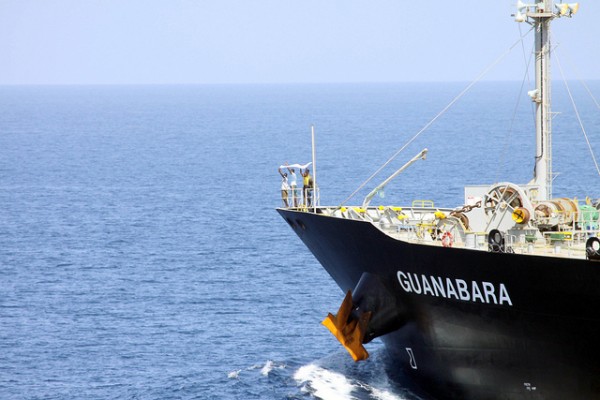
Pirates surrender to a NATO counter-piracy task force (Photo: Official U.S. Navy Page via Flickr).
Two things you can do about a problem: something or nothing. James Harris
Each year, the intelligence community presents an annual threat assessment to Congress. They publish an unclassified version that I and many national security geeks read very closely. The intelligence community takes a lot of hits in the media over lack of transparency, although it’s worth noting that the community releases lots of unclassified and declassified information, at least if you know where to look. For whatever reason, the mainstream media does not do much reporting on this.
This year’s report came out in February. Normally, I only pay attention to what the report reveals about topics like cyber, terrorism, regional threats, etc. This year, perhaps because I had been invited to attend an International Women’s Day Conference sponsored by Oxfam America last month, I looked at the section of the report discussing potential economic ramifications on global stability much more closely.
One paragraph in particular jumped out at me:
Global political instability risks will remain high in 2015 and beyond. Mass atrocities, sectarian or religious violence, and curtailed NGO activities will all continue to increase these risks. Declining economic conditions are contributing to risk of instability or internal conflict.
I’d learned firsthand over the years the negative impacts on regional stability that a nation’s unstable economy coupled with political and social problems could have. I spent much of the ‘90’s on the staff of U.S. Central Command Naval Staff (NAVCENT). I would have never predicted that the economic, social and political problems of Somalia would lead to a modern day piracy problem. On their web site, NAVCENT states:
The rise of piracy in the region can be directly linked with the fall of the stable government and breakdown of law and order in Somalia in 1991. Gangs formed under local clan loyalty and warlord leadership and developed into the piracy groups of today.
I found the Oxfam Conference I attended to be very informative. As they say on their website, Oxfam America is a global organization working to right the wrongs of poverty, hunger and injustice with a mission to create lasting solutions to poverty, hunger, and social injustice. The conference theme focused on the issue of natural resources and rights. The problem is that while oil, gas, and mining projects in the developing world are generating billions of dollars for corporations, poor people in these countries are not benefiting.
Some of the other key points made during the conference:
One of my pet peeves is situations where people talk about the problems but offer no solutions. I was happy to see that was not the case at this conference. Apparently the United States has an opportunity to have a huge impact on this issue. In 2010 Congress passed a law as part of the Dodd-Frank Act that requires oil and mining companies listed on U.S. stock exchanges to publish their payments to governments for national resources – often millions of dollars, frequently in poor countries, and one of the biggest targets for corruption and waste. Other countries have followed our lead, and now the European Union, Canada and Norway have passed similar laws. A remaining problem in our country is that the Securities and Exchange Commission (SEC) is still working on the regulations due to legal challenges and that is holding up the process. Oxfam is calling on the SEC to finish the rule this year and give communities and investors access to this information.
I came away from the conference much better informed than I had been on these issues and their importance to regional stability. I also got to meet and interact with some powerful women doing awesome things in this area. Two in particular stood out to me. Hannah Owusu-Koranteng, a founding member of the Wassa Association of Communities Affected by Mining (WACAM), a mining advocacy NGO in Ghana; and Muthoni Muriu of Oxfam, who is leading that organization’s efforts to design innovative, effective programs that reduce poverty and achieve lasting change.
I couldn’t help but think of the powerful women who got together to end Liberia’s 14 year Civil War. Their story is told in the documentary, “Pray the Devil Back to Hell.” It should be required viewing for national security types like me to remind us that national security challenges are not just all about what military forces a nation has or what are a nations stated and unstated security goals. I can only speak for myself, but I can’t help but wonder if I had taken the time to always look at more than just the military aspects of a situation, I would have been better equipped to predict unintended consequences.
As always, my thoughts are my own.